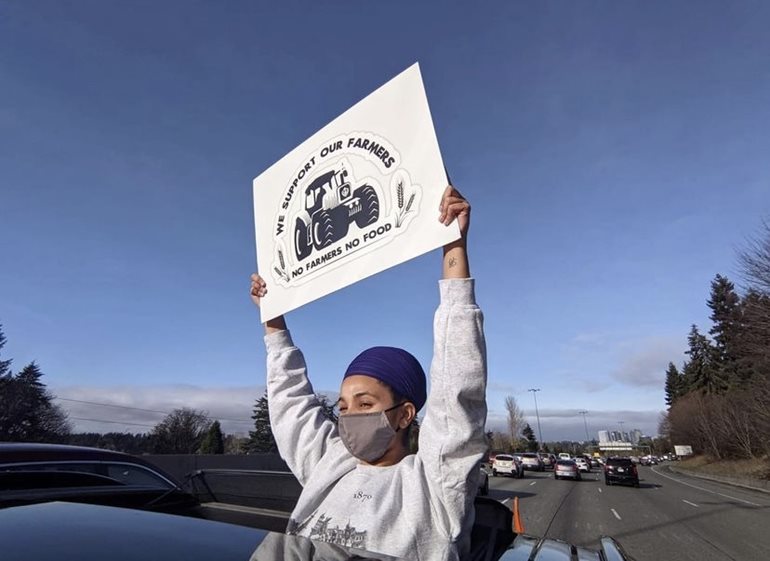In fall 2020, farmers in India began a protest that would end up becoming one of the largest civil disobedience campaigns since the country won its independence from Britain. Their demonstrations, often rallying hundreds of thousands of people, laid bare the dire reality of inequity that can be traced back to the introduction of the Green Revolution in the 1960s.
The Green Revolution marked the beginning of the farmers’ decline. Their soils became diseased, their crops infested with pests, and as a result, many farmers went into debt. At the same time, the suicide rates amongst Punjabi farmers began to rise.
The recent uprising was spurred three “2020 farm bills” that were being considered by the central government without sufficient input of farmers or their unions, said University of Washington Bothell alumna Sharndeep Shoker ’21, whose capstone research focused on the plight of the farmers.

While the new laws promised growth and sustainability, many farmers saw them as “death warrants” and feared they would cut into their already sparse profits and favor large corporations.
In a way, the bills were harbingers of death, she explained, as farmers in India have a higher rate of suicide than the general public — and most commit suicide due to financial stress. Shoker made this the subject of her student research because she felt a personal connection to the farmers’ struggles. Like them, she is Punjabi, and she has also lost a loved one to suicide.
Living a legacy
After her best friend took his own life, Shoker was forced to come to grips with the fact that suicide can affect anyone — a friend, a classmate or a farmer in Punjab.
When she heard about the suicide in India, she thought of her friend and decided to leverage her education as a student in the Master of Arts in Policy Studies program. Through her capstone project, she wanted to call public attention to the injustices the farmers were facing and the deadly consequences that come with it.
“The circumstances with the farmers and my friend are different,” Shoker said. “How they coped with their stress is the same. I couldn’t intervene and save my friend, but I hoped that by doing this research it would spark a conversation and, at the very least, bring some awareness.
“I couldn’t just do nothing, especially not when I knew.”
While past research indicated that farmers in India are at an increased risk of suicide due to financial hardship, Shoker decided to dig deeper. “I had to go beyond that and figure out what is putting so much pressure on farmers that they feel if they don’t make enough money, their life isn’t worth living,” she said.
By conducting a series of interviews with Punjabis who lost relatives in the farming industry due to suicide, Shoker was able to obtain the answers she sought.
Her motivation and drive impressed Charlie Collins, associate teaching professor and Shoker’s faculty adviser. “Sharn’s way of integrating her own personal positionality, as a woman from Punjab with a background in political science, made for a project that was personally, intellectually and politically relevant. I find projects that can blend these multiple interests to be the most compelling.”
Lessons left behind
As a Punjabi, Shoker had connections to the community and was able to get eight individuals to participate in her capstone study. Some were friends of friends, others were family acquittances, all were Punjabi who had lost a loved one in farming to suicide.
While Shoker said each conversation was different, the key question she asked was always the same: Can you tell me the story about the farmer who either attempted or died by suicide?
Shoker said the responses unearthed common themes, including patriarchy and the value of land. One of the respondents spoke about how the stress of patriarchy isolated the farmers, explaining that his father held the burden of their family’s financial situation all on his own.
“My mother, siblings and I didn’t even know that we were in such a deep debt,” he told Shoker. “We knew we had money issues, but we never knew how bad those issues were. We only learned about our financial situation after his death. My father took on the stress for the rest of my family, and now that stress has been passed onto me because I am the oldest son. I hope I can take his struggles as a lesson.”
The interviews Shoker conducted also revealed that land for a farmer in Punjab goes beyond monetary value as it is passed down from generation to generation. “It is seen as part of the family history, and owning it comes with the responsibility to uphold the family legacy,” Shoker said.
One of the interviewees she spoke with told her, “There is a famous saying that relates to the story of my relative who passed away. A farmer’s field and his life are one and the same. If his field succeeds, he succeeds. If his field fails, he fails.”
Making a stand
Farmers in India feared that the 2020 farm bills threatened to dramatically shift the farming structure across the country.
“The bills were designed to help big corporations have complete control over agriculture,” Shoker said. “One of the goals was to eliminate the minimum price guarantee which acts as a minimum wage and protects farmers from market volatility and natural disasters.
“It’s horrible the lack of care the government has for farmers, especially because they account for 18% of India’s gross domestic product.”
Punjabi farmers were frustrated and decided they had enough. Hundreds of thousands of them left their homes and stayed in the streets of Delhi, refusing to leave until the bills were withdrawn. “I had family members in Punjab, and they told me that each month they would send three to four village members to stay in the streets,” she said. “That’s how the protestors were able to keep their momentum.”
Showing solidarity
To show her support from 7,000 miles away, Shoker participated in and spoke at local protests in the Puget Sound region. Most notable was a car rally from Renton to Bellevue where thousands of people drove along I-405 holding signs saying, “No Farmers, No Food.”

She also took part in a protest in front of Seattle City Hall as well as one in front of Facebook’s headquarters in Seattle to protest the company’s monitoring and removal of posts regarding farmer protests in Delhi. “I didn’t want these farmers’ deaths to be in vain,” Shoker said. “There needed to be some sort of accountability and justice.”
And thankfully, there was. On Dec. 1, 2021, the prime minister of India repealed the laws. “The protests proved to the government that the farmers were not going to back down. I hope that the farmers realize their voice can have an impact for change and that they continue to speak up,” Shoker said. “This was a win, but there is still so much work to do.”
She hopes that her published research will inform the public of what is happening in Punjab and spark action.
“My wish is that this doesn’t fall through the cracks and become something people in the United States knew about for a few months and then move on from,” she said. “I pray it’s something we keep in our minds and that if we have the opportunity to act — whether it’s going to a protest, signing a petition or sending money — that we do it.”
Collins echoed her sentiment. “Sharn’s project makes clear how pairing corporate greed with government power can result in devastation for communities and individuals,” he said. “I am hopeful her work, and the work of others, will continue to shine a light on this very important issue.”
Mental health matters
Now that her student research on Punjabi farmers is completed and the laws have been repealed, Shoker is turning her attention closer to home.
After graduating from the University, she accepted a job as outreach and engagement manager at the Mockingbird Society, a nonprofit that addresses issues of youth homelessness. In her role, she supports homeless youth as well as children in foster care, committed to making a positive impact on their mental health and in their lives more broadly.
“I always want to make sure that whatever I do, it makes a difference. I am doing this to honor my friend.” she said.



